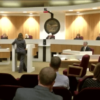Changing House Rules Will Weaken Checks & Balances

As former House Speakers and Senate Presidents of the Montana Legislature, we question the wisdom of making significant changes to the rules of operation in the Montana House. Currently, there is a group of legislators trying to change the House rules. One of the proposed changes would allow a simple majority (51 members) to “blast” a bill out of committee and on to the House floor. Their logic is that the Montana Senate operates under simple majority rules so the House should follow suit. The House has twice as many members as the Senate; thus, there are significantly more bills introduced in the House each session. Respecting committee work and requiring super majority votes and Speaker controls under certain circumstances allows for an orderly and expedited legislative process. Just about every other state House across the country operates under similar rules currently used in the Montana House. For almost 30 years, the current rules have served the legislature well, under both Democrat and Republican majorities.
Many state legislatures across the country allow a committee chairperson or a select committee to determine which bills ever get a hearing, thus controlling bill volume. In the Montana House, every bill is required to get a hearing, and committees with jurisdiction and experience in the bill’s particular subject matter spend hours reading bills, listening to public input, debating the merits of the bill and proposing amendments. With a simple majority in the committee, bills are voted up or down, and either stay in committee or move onto the House floor for consideration of the entire body. If House members desires to overturn a committee decision, then 60 members of the House must vote to “blast” the bill from the committee for a full debate on the House floor.
The members proposing House rule changes claim that bills are subject to unfair committee hearings. Currently, the House rules have an appendix that requires bills to be assigned to certain committees. A tax bill must go to the Taxation Committee, agricultural related bills must go to the Agriculture Committee, human services bill must go to Health and Human Services Committee, etc. One proposed rule change would eliminate this appendix and allow a simple majority of legislators (51) to move a bill from one committee to another committee, allowing a bill to be shopped from committee to committee in order to pass it to the House floor for a final vote. Under the change, a human services bill could end up in the Transportation Committee, whose membership may not be well versed in the subject matter, just because it’s an easier path to the House floor. This type of process encourages back room deals with little public involvement and gives lobbyists the power to push bills through the process by convincing a small group of legislators to do their bidding.
The Founders purposely designed our government so that legislation would be difficult to pass. In order that a new law is properly vetted, the Legislature must ensure a thorough hearing process, robust public input and proper checks and balances. The current House rules ensure those checks and balances. The proposed changes to the rules may not.
Please contact your Legislator and let them know that we do not need more power consolidated into the hands of lobbyists and a small group of Legislators wishing to bring more Washington DC style backroom deals to our State Legislature. Ask them to keep the House rules that have worked well for three decades.
By:
Former Speaker Austin Knudsen, Culbertson
Former Speaker Mark Blasdel, Somers
Former Speaker & Current President Scott Sales, Bozeman
Former President Bob Keenan, Big Fork
Former President Debby Barrett, Dillon
Former Speaker Doug Mood, Seeley Lake
Former Speaker Dan McGee, Laurel











